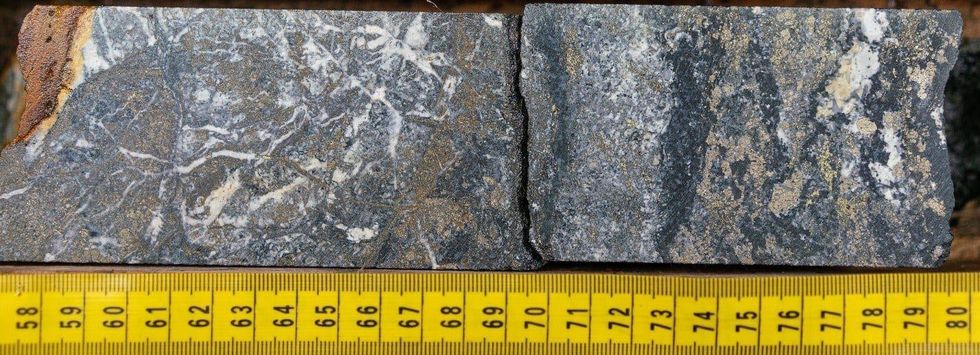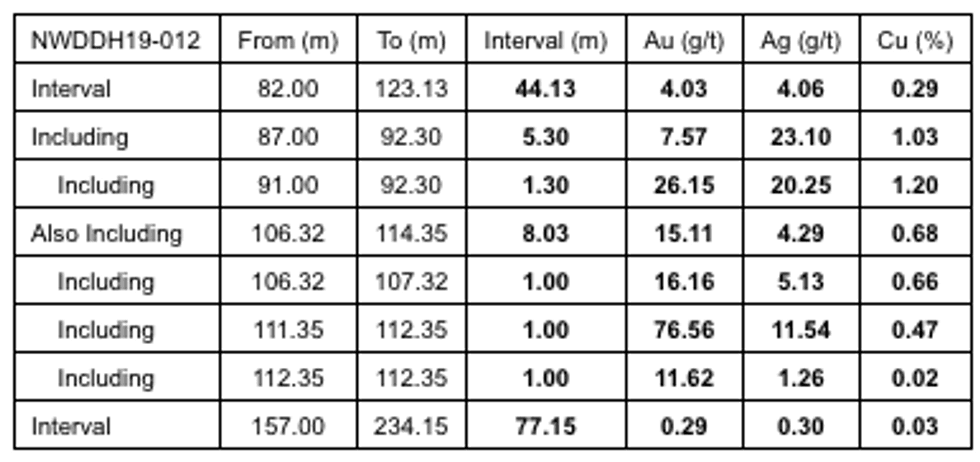Crystal Lake Intersects 15.11 g/t Gold over 8 Metres at Newmont Lake Project, BC
Crystal Lake Mining Corporation is pleased to announce the intersection of shallow high-grade gold mineralization at Newmont Lake Gold Corridor.
Crystal Lake Mining Corporation (TSXV:CLM, OTC:SIOCF, FSE:SOG-FF) (“Crystal Lake” or the “Company”) is pleased to announce the intersection of shallow high-grade gold mineralization at Crystal Lake’s Newmont Lake Gold Corridor. The new results are crucial as they provide evidence of a thick unit of unusually high-grade gold mineralization within a broad envelop of continuous low-grade gold mineralization. This discovery is important as it demonstrates that the mineral zone actually increases in both width and in grade in areas where previous models indicate a narrowing of the mineral zone. Additionally, a second deeper horizon has been intersected in an area without gold mineralization in previous models adding to the exploration potential of the Newmont Lake gold corridor along the western flank of the Eskay Rift in NW BC.





Highlights:
- The second of three drill holes, building on the northern extension of the Northwest zone, intersected 15.1 g/t Au over 8.03 metres (106.32 metres to 114.35 metres), including 76 g/t Au over 1 metre, in addition to an even shallower high-grade intercept of 7.6 g/t Au, 23.1 g/t Ag and 1.03% Cu over 5.30 metres starting just 82 metres downhole (including 26.1 g/t Au over 1.3 metres);
- These two shallow high grade gold zones form a thick continuous intercept of 44 metres (82 metres to 126.13 metres, approximate true width) grading 4.03 g/t Au, 4.06 g/t Ag and 0.29% Cu, in addition to a deeper wide interval of disseminated gold mineralization (77 metres @ 0.29 g/t Au) starting 157 metres downhole which points to the potential for new discoveries including more high-grade mineralization at depth;
- Ongoing drilling of this significantly upgraded portion of the NW Zone Historic Resource* has encountered visually similar mineralization in the third hole completed along section with an estimated down-dip step out of approximately 22 to 30 metres. Assays are pending.
- The fourth hole on section in the Newmont Lake Gold Corridor is ongoing.
Dr. Peter Lightfoot, Technical Adviser to Crystal Lake, commented: “The western flank of the Eskay Rift is endowed with significant high-grade mineralization styles that fit with a wide range of deposit models, and require very efficient pathways for fluids and magma to migrate from depth to the surface and form ore deposits. The gold mineralization developed along the western flank of the Newmont Lake graben is part of this wider mineral system, and Crystal Lake is aggressively developing an understanding of how the high-grade gold mineralization relates to the McLymont fault, its subsidiary faults and associated hydrothermal breccias.”
Assay Highlights from Newmont Lake Gold Corridor Second Drill Hole (NWDDH19-012)
Collar Coordinates for Newmont Lake Gold Corridor Second Drill Hole (NWDDH19-012)
The Historic Resource* (historic inferred resource) that contains 1,406k tonnes at an average grade of 4.43 g/t Au, 0.22% Cu and 6.4 g/t Ag at a projected “base case” cut-off grade of 2 g/t Au containing 200,000 oz Au, 6.79 million lbs of copper and 291,000 oz of silver (Mineral Resource Estimate on the North West Zone, Newmont Lake Property, submitted to Romios Gold Resource Inc., May 11, 2007). This resource estimate was based solely on the drill hole data collected by Gulf Minerals in the late 1980’s and early 1990’s.
Qualified Person
The technical information in this news release has been reviewed and approved by Mr. Maurizio Napoli, P. Geo., VP Exploration for Crystal Lake Mining, a Qualified Person responsible for the scientific and technical information contained herein under National Instrument 43-101 standards.
Quality Assurance/Quality Control
Drill core samples from the Northwest Gold Zone were sent to MSALABS’ preparation facility in Terrace, B.C., where samples were prepared using PRP-910 method. Core Samples were dried, crushed to 2mm, split 250g, and pulverized to 85% passing 75 microns. Prepped samples were sent to MSALABS’ analytical facility in Langley B.C., where 50g pulps were analyzed for gold using the FAS-211 method, fire assay AAS finish. Core samples were analyzed for 53 elements using the IMS-230 method, multi-element ICP-MS 4-acid digestion, ultra fine trace level. Silver assay results greater than 100 g/t Ag and cobalt, copper, nickel, lead, and zinc greater than 10,000ppm were automatically analyzed by ore grade method ICF-6.
Crystal Lake Mining conducts its own QA/QC program where five standard reference material pulps, five blank reference material samples, and two field duplicates are inserted for every 100 samples when analyzing core samples.
About Crystal Lake Mining
Crystal Lake Mining is a Canadian-based junior exploration company focused on building shareholder value through high-grade discovery opportunities in British Columbia and Ontario. The Company has an option to earn a 100% interest in the Newmont Lake Project, one of the largest land packages among juniors in the broader Eskay region in the heart of Northwest B.C.’s Golden Triangle.
On Behalf of the Board of Directors,
CRYSTAL LAKE MINING CORP.
“Richard Savage”
President & CEO
Email: info@crystallakemining.com
Phone: 1-604-440-8474
https://crystallakemining.com/
Forward-Looking Statement
This news release may contain certain “forward looking statements”. Forward-looking statements involve known and unknown risks, uncertainties, assumptions and other factors that may cause the actual results, performance or achievements of the Company to be materially different from any future results, performance or achievements expressed or implied by the forward-looking statements. Any forward-looking statement speaks only as of the date of this news release and, except as may be required by applicable securities laws, the Company disclaims any intent or obligation to update any forward-looking statement, whether as a result of new information, future events or results or otherwise. Neither TSX Venture Exchange nor its Regulation Services Provider (as that term is defined in the policies of the TSX Venture Exchange) accepts responsibility for the adequacy or accuracy of this release.
Cautionary Statement of Historic Resource*
The mineral estimate cited above is presented as a historical estimate and uses historical terminology which does not conform to current NI 43-101 standards. A qualified person has not done sufficient work to classify the historical estimate as current mineral resources or mineral reserves. Although the historical estimates are believed to be based on reasonable assumptions, they were calculated prior to the implementation of National Instrument 43-101. These historical estimates do not meet current standards as defined under sections 1.2 and 1.3 of NI 43-101; consequently, the issuer is not treating the historical estimate as current mineral resources or mineral reserves.
Cautionary Statement of Photo Gallery:
Please note the visualizations are selected images highlighting strong visual mineralization from recent diamond drill core. These “high-grade images” should not be considered representative of the entire drill hole. The reader is encouraged to exercise caution, due their due diligence, and determine their own conclusions with the information provided.







